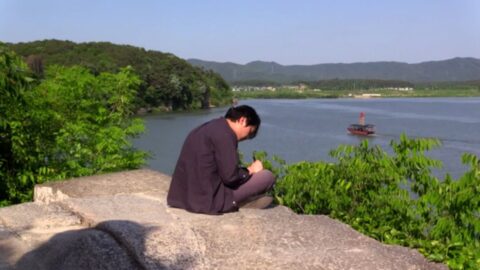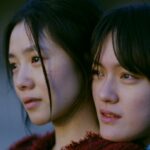At the press conference of What Does that Nature Say to You (Hong Sangsoo, 2025), facing journalists’ questions about creative choices and the central message of the film, Hong mostly answered with “I don’t know” and “I just felt like doing it.” Much like his intuitive approach to filmmaking, his latest is more about the feelings and experiences we draw from the film, rather than any rational analysis.
35-year-old Donghwa (Ha Seongguk) drives his girlfriend Junhee (Kang Soyi) to her parents’ house and ends up spending the day with her family — talking, eating and drinking. Not much happens, just the usual conversations about a new moustache, an old car, poetry and death, ending with a small clash after a bit too much alcohol — just like everyday life. After In Water (2023), Hong gives us another blurry film. Donghwa doesn’t normally wear glasses but says he doesn’t mind the blurriness. Perhaps Hong is inviting us to see the world through Donghwa’s eyes (and Hong’s own eyes, with his deteriorating eyesight). But perhaps we don’t need to always see things so clearly. Ambiguity leaves space for the poetic.
The most aesthetic moment is probably when Junhee’s dad Oryeong (Kwon Haehyo) and Donghwa sit on a bench against the backdrop of lush green leaves and the mountain, talking about seeing the sunset and loving someone so deeply that you’d change the shape of the mountain for them. Donghwa says he only wants to live with what is absolutely necessary, and Oryeong says his wife directly experiences things in life and derives knowledge from that rather than books. Then Donghwa says we will all die and all there is to do is to experience deeply; and Oryeong says a life spent searching for beauty is good, isn’t it?
It’s a very quotable film, yet it’s obvious the female characters are rarely given any space for such introspective contemplation. In fact, Junhee’s mum and sister start to take on almost villainous characters, as the realists who despise idealists’ dreams and strip the aesthetic from them, while Junhee is just a boring good person who never has any thoughts.
Apart from the dialogue, sound is ever-present: cars roaring, chickens clucking, dogs barking, leaves rustling. Perhaps it’s about being truly present in this world and experiencing it to the full, but I guess Hong just felt like doing it. In response to the significance of symbolism in this film, he said “I don’t believe in symbols” and that lots of the things he lingers on in his films don’t mean anything. When asked about how he defines cinematic poetry, Hong said definitions are useless, and that he prefers creating to wasting time defining something.
Perhaps the way to approach this film is just to focus on the individual experience. I think Hong will probably like the quote from The Waves (1931) by Virginia Woolf, “I am made and remade continually. Different people draw different words from me.”
Ariadne is a film writer specialising in sensory and arthouse cinema.





